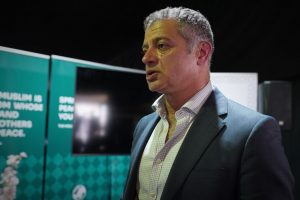
With every adversity comes opportunity, and at times personal suffering instils within our souls a desire to help others similarly afflicted, to open our hearts and heal our wounds through our shared experiences. In doing this, many of us find the peace not just to accept these trials but also to transcend them – for our trials to transform and repurpose our priorities. We grieve better when we grieve together but perhaps there is no better catharsis than to be able to play our part in opening doors (however small) for others to find ointments for their grief. When Zainab’s young son was diagnosed with autism before he was even three, she chose this more innately cathartic and fulfilling path in grappling with this challenge. Zainab, who is a public policy professional, decided to set up a charitable foundation that would provide support to similarly placed parents in her home country, Pakistan. In doing so, Zainab’s own small wonder, her son, became the impetus for uniting the shared wonders of other parents when ‘Our Small Wonders’ was born. This is their story. This interview was conducted by Ayesha Malik who is the Editor of the Law and Human Rights Section of The Review of Religions.
1.What was the inspiration behind ‘Our Small Wonders’ and could you tell us a little about its inception, philosophy and work?
Our Small Wonders (OSW) is a volunteer organisation created by a group of parents and professionals who would like to see more autism awareness and acceptance in Pakistan. Our purpose is to provide information, advice and support on autism for Pakistani communities.
When I was six, my uncle gave me taped episodes of a programme called ‘Small Wonder’. It was a programme about a family with an inventor father, mother, son, daughter and a girl robot. The girl robot, Vicky, is part of the family, disguised as a distant niece. Everyone treats her like she is a child. She tries very hard to pretend to be a child. She imitates actions. She repeats dialogue. She even invents a laugh. She is nearly like any other child. Nearly. I loved those episodes. I watched them over and over again till that VHS tape reel hung out from the edges. Somehow even at six, I knew I would have a child-that-was-nearly-like-any-other-child. Even at six, I knew I would have a small wonder.
My son was diagnosed with autism before his third birthday. By the time he was 9 and rewriting the script life gave him, my husband and I wanted to help others who were starting out on their autism journey. And somehow, after we had put that aim into words, our paths crossed with other parents and professionals who were interested in our vision.
We were very conscious of not becoming just another group of Pakistani expats trying to do ‘good’ in Pakistan while living abroad. Therefore we spent nearly half a year doing research as to where we could add most value. We found that there is a general lack of awareness and understanding about autism in Pakistan. There are a lot of myths about both its cause and ‘cures’, with a majority of the blame being put on mothers.
As we explored further, we also came across an inspiring set of parents and professionals who were, through their example, creating pathways for other parents and professionals to follow. But at the same time, we also found a growing, unregulated set of ‘professionals’ entering the field, setting false expectations for parents while charging them exorbitant amounts of money. We also observed that parents had poor understanding of their own role in their child’s development and had false expectations of what professionals can accomplish for the right amount of money.
Overall, there are limited number of schools in Pakistan where awareness of autism exists and where mainstream provisions for children are offered. There are some excellent organisations working on special needs in Pakistan. However, most of their focus is on physical additional needs and there is limited understanding of neurodiversity. Additionally, a very limited number of employers have awareness of autism and offer inclusive working environments.
We at OSW strongly feel that love and acceptance of a person with autism, and a focus not only on their differences but their strengths can have a very powerful impact in bringing out the best version of themselves. That is why OSW started its mission with a focus on parents – not only in providing them with information, but by starting a conversation on the emotions you go through on your autism journey.
We have since started broadening our focus to employers, teachers and medical professionals so we can start creating broader awareness and acceptance in our communities.
2. What existing gaps in this field has ‘Our Small Wonders’ been able to fill and to what extent would you describe its work to be pioneering?
OSW has created space for a conversation about autism within Pakistani communities.
For parents, OSW is signposting information and advice to families from Pakistani communities, providing them support through their autism journey. This includes a detailed searchable directory of organisations offering services – from schooling to therapies – in Pakistan. We know through personal experience how overwhelming different sources of information can be. Walking the balance between hope and acceptance can be especially hard – when one is torn between doing anything for one’s child to make them happier, yet need to accept that autism will always be a part of who they are and who they will become.
For people with autism, OSW is offering a platform to be able to tell their story. For grandparents, family and friends, OSW offers practical information on how they can provide support within their family and to others with autism in their wider networks.
For organisations working on special needs in Pakistan, OSW offers collaboration including creating bespoke resources for them on autism to amplify their impact. For other organisations – employers, educational institutions, medical professions, OSW offers bespoke resources to create inclusive environments.
There are many other inspiring individuals and organisations working on inclusion in Pakistan and each adds value. I think what makes ‘Our Small Wonder’ different, is our ability to share information based on different countries and different contexts. We are parents and professionals based in different countries who have ‘lived’ autism in different ways. We are also a volunteer organisation – we do not give out funding nor receive funding from any organisation, which adds to our authenticity and helps to deliver our aim of being an independent and trusted source of information for parents and professionals in our community. We are not in competition with anyone and love collaborating with other organisations to amplify what they are doing – all of which adds to the overall support available in our communities.
3. You spoke about neurodiversity and how its nuances are still not fully understood within this field of work. Could you tell us briefly what neurodiversity is and its role in understanding autism?
The term neurodiversity means differences in the way the human brain functions, socialises, learns and pays attention. It covers autism but also includes other conditions such as dyslexia and ADHD. We at OSW refer to it as a ‘different way of being’.
Autism is a lifelong developmental disability associated with poor social skills. It is sometimes referred to as an ‘invisible disability’ as there is nothing about the appearance of people with autism that sets them apart from other people. However, people with autism may communicate, interact, behave and learn in ways that are different from most people.
Autism is widely misunderstood. Unlike what many people in our communities continue to think, individuals with autism do have emotions and are able to form attachments with others, although they may express them differently. Similarly, many individuals with autism can communicate. This may be through the use of language, gestures, picture exchanges, sign language or computer technology.
There are currently no known causes of autism, although genes are considered as one of the risk factors that can make a person more likely to develop autism. Autism also does not have a known cure, although research shows that early intervention therapies can help an individual’s overall prognosis.
There are many myths that exist about the intellectual abilities of individuals with autism. What is important to understand is that autism is not the same as an intellectual disability or mental retardation. Nor is every child with autism a genius. Every person with autism has their own unique strengths and challenges. Children on the autistic spectrum present a full range of IQ scores, just like the other typically-developing children.
4. At the moment, ‘Our Small Wonders’ is set up as an online repository of information on autism. Do you feel the venture needs to expand to also offer support and networking to parents of children with autism?
Yes absolutely. Through 2020 we have built our presence on social media – Facebook, Twitter, Instagram and Vimeo. Parents can and do reach out to us through those channels and we do offer direct advice and support, all the while making it clear that we are not a substitute for professional, medical advice (often advising them to seek it!). We are currently thinking of the best ways to create more networking opportunities between parents.
One thing we are thinking about carefully is how to manage the differences in how families experience a ‘spectrum condition’ like autism. A ‘spectrum condition’ means that there are differences in people with autism just like there are differences between people who don’t have autism! The range of consequences is also extensive. At one end of the spectrum is the autism of a computer scientist that may not be noticeable to others at all, while at the other end, a quarter of children with autism cannot speak. We are thinking about how we manage this challenge to make sure that our platform connects parents in meaningful ways.
5. One of the key things ‘Our Small Wonders’ does is to reach out to educational institutions and work with different curricula in raising awareness and identifying concerns. Tell us a little about some of the things that you have been doing in this regard and how positive do you feel the responses/results have been?
We started reaching out to educational institutions mid-2020 and we have been very excited to have done workshops with a few on how to make learning environments more inclusive for neurodiverse learners. But we are only starting and there is a long way to go to create genuine inclusion in most schools in Pakistan.
6. Where do you hope to see ‘Our Small Wonders’ in 5-10 years time?
Great question! I would like OSW to be a trusted source of information, support and advice for parents and professionals in Pakistani communities and for it to have a greater presence in Pakistan. And on the way, I hope we are able to help employers, schools and other public spaces to become more inclusive, support families on their autism journey and give them enough information and inspiration to rewrite their own stories.
About the Author: Zainab Kizilbash is a public policy professional, mother, economist and writer. After studying on a scholarship at York University Canada and London School of Economists in the UK she worked with governments in Namibia, Ghana, Tanzania, and Pakistan. She now lives and works in the UK. In 2019, she set up Our Small Wonders.




Add Comment